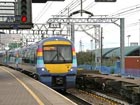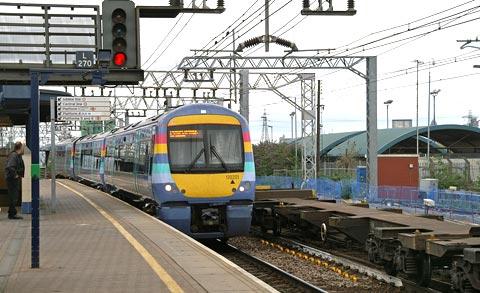| Videos | • Latest |
|
• Feature | • Sports | • Your Videos |
London confident in Olympic transport

 0 Comment(s)
0 Comment(s) Print
Print E-mail CNTV, April 12, 2012
E-mail CNTV, April 12, 2012
One of the biggest challenges for the organizing committee of the London 2012 Summer Olympics will be ensuring their transportation infrastructure is able to deal with the demands of the event.
 |
|
Stratford is already an important transport hub – the future Olympic Park to the right in this view. |
Billions of pounds have now been invested, and Britons are feeling increasingly confident that the work that has been done will help ensure the British Capital delivers on this very important aspect of the Olympics Games experience.
12 million public transport journeys are made every day in London. The transport infrastructure of this historic city has undergone a major overhaul to make those journeys as quick and easy as possible for Londoners and their visitors.
And with the logistical challenge of hosting the 2012 Olympics on the horizon £6.5 billion has been invested in improving services and increasing capacity, with those updates now complete and fully operational.
Justine Greening, Secretary of State for Transport, said, "This is a public transport games so we need to make sure we have the capacity in place and the planning ahead of time working with the public, but also keeping London moving to make sure we deliver great games."
2012 will be London's third Olympic Games. The transport system has come a long way since 1948 when British boxer Ron Cooper and Hungarian swimmer Susan Halter used their competitors passes to get around.
|
|
|
Long distance, regional and suburban rail services will cater for much of the demand for reaching south-east England's Olympic venues. |
A recent visit to The London Transport Museum triggered happy memories of those '48 games for these veteran Olympians.
Ron Cooper, British lightweight boxer, 1948 Olympic Games, said, "This is the 1948 Olympic vest that I actually boxed in. 1948. I don't care what anyone says, that's the pinnacle of all sport - the Olympic Games. It's all the world you've got to compete and you've got to try and beat the best. This is a jab, hook and a cross. Elbows in, chin down and bend the legs so that you get all what you want to get in.
The London Underground is the oldest metro in the world, transporting passengers around the city since 1863. On peak days 4 million journeys are made per day on the tube and that will increase during the games.
With all upgrades complete, underground users are already benefiting. Stratford, East London, the principle hub of the Games is now one of the best connected stations in the United Kingdom. The staff in the control room here will operate the nerve centre of the station and like the Olympic athletes they have been trained and prepared.
Peter Masterman, Stratford Duty Station Manager, said, "Everybody works together and we work with the buses, we work with the roads, we work with the councils. So I think it's an element of everybody gets to shine for the Olympics."
The Jubilee line has increased capacity and will provide an efficient service delivering spectators from central London to the Olympic Park. The tube services will run later and more frequently across the network.
All spectators attending the games will receive a free All Zones Travel Card for the day of their event.
Leon Daniel, Managing Director of TFL Surface Transport, said, "During the Olympic Games, when the games are on we're expecting another 3 million journeys. People will be able to use their Oyster Card and they'll be able to travel on the buses, on the underground. They'll be able to use the network seamlessly."
One of those buses, the double decker Routemaster London bus is an iconic symbol of the city and has been since it was first introduced in the middle of the last century. A new Bus for London has just been launched based on that Routemaster.
This bus uses the latest green technology and features an open platform that will enable passengers to hop on and hop off in safety. The crew of the 38 Bus take great pride in the fact that they have been selected to operate this new icon for London.
Umit Komur, bus conductor & driver, said, "It's something I can say to my grandkids, I was one of the first ones to drive it and I was one of the first ones to conduct. I'm part of history. I'm proud to be a Londoner because in 2012, everyone's watching us."
The Javelin is London's very own bullet train. Charging at speeds of up to 140MPH it can reach the Olympic Park in just 7 minutes from Kings Cross in central London, running 8 – 10 trains per hour during the games.
But Londoners and visitors are also being encouraged to use less high tech modes of transport, i.e. their feet. If you can take the time to look up it's a great way to take in many of the city's landmarks.
Leon Daniel said, "Cycling and walking is a really great way to get about the city and in fact in some cases it's the quickest way to get about.
In a quest to get more and more Londoners on their bikes, a cycle hire scheme was introduced in July 2010. The success of the scheme is clear with well over 10 million cycle hires made since the launch. The cycle hire zone is expanding to meet demand and will reach the Olympic Park in East London by the time of the games.
Justine Greening, Secretary of State for Transport, said, "So I think the legacy for the Olympics is if we can keep London on the move and get all of our athletes and spectators to the games on time, I think we'll have some longer term benefits to keep our city on the move going forward."
But the transport links don't just stop at the boundaries of the city. A comprehensively connected network now links London with towns and cities across the United Kingdom and mainland Europe.
With international airports serving overseas customers throughout the United Kingdom, visitors can easily reach Olympic events and tourism attractions across the country this summer. Back in the 1948 Olympics, all the competitors used London transport to travel to and from their events.
Suan Halter with Hungarian Swim Team, 1948 Olympic Games said, "We travelled by Underground, we went to Wembley and then from Wembley we used to go to Hendon where we were fed because that's where the boys were and then then we had to go back again to St Helen's, Northwood."
London 2012 promises to be spectacular games and is sure to provide life long memories, just as the 1948 games did.
Suan Halter said, "I was very pleased to actually get into the Olympics because one had to swim very hard to get in and after the war it wasn't easy to swim at all and I thought that I always wanted to be in London and actually Wembley meant such a lot to me and to have an Olympic blazer."
Suan Halter said, "There was the opening ceremony and I remember they said the idea of the Olympics was not to win but to take part, to compete. There was a big slogan up there. Do you remember?"







Go to Forum >>0 Comment(s)